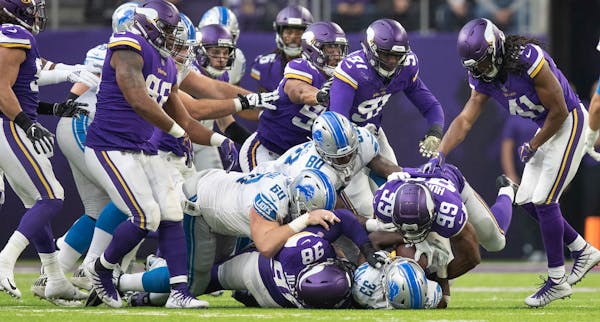The Seattle Seahawks' "Legion of Boom" secondary was at the height of its powers, just eight months removed from a Super Bowl win, when current Vikings quarterback Kirk Cousins came to town with the Washington Redskins on a Monday night in 2014. Cousins, in his seventh NFL start, fell in a loss like many quarterbacks did against a Seahawks defense on its way to another Super Bowl appearance.
"I don't know that any of that secondary will be playing on Monday night," Cousins said.
Just four years later, Cousins and the Vikings offense won't exactly look up at Goliath during Monday night's pivotal NFC matchup in Seattle. Nearly the entire Seahawks defense has undergone a transformation that can happen in a few blinks in the NFL. In its bid to be the league's next model of consistency, the Vikings defense is fighting some of the same natural forces that shredded the Seahawks' fabric.
Not playing for the Seahawks are the three All-Pros, Richard Sherman, Kam Chancellor and Earl Thomas, before either turned 31 years old in Seattle's secondary, which now starts three 23-year-old prospects and a sixth-year journeyman.
The only one still on the roster, Thomas, was last seen flipping the bird at his own sideline after a contract dispute ended in his season-ending injury.
Injuries, contracts and free agency are the primary threats to a dynastic defense. The Vikings — sixth in yards allowed and 14th in scoring this season — have so far put up a shaky encore to last year's No. 1 rankings.
But their points of emphasis remain sharp. The Vikings defense is still No. 1 on third downs. It's the only NFL defense forcing more field goals than touchdowns in the red zone. And, while allowing an NFL-low 15 passing touchdowns, the Vikings defense is on pace to be the first to surrender the fewest passing touchdowns in back-to-back seasons since the Tampa Bay Buccaneers in 1998-99.
That kind of premier-level consistency is fleeting, as coach Pete Carroll knows after his Seahawks achieved the rare four consecutive seasons with the No. 1 scoring defense from 2012-15.
"It does take a commitment by the franchise to keep your guys together," Carroll said. "Because free-agency guys are coming and going a lot. You have to stick with your guys if you're going to hope to develop the kind of chemistry that allows you to really get good playing together."
Vikings General Manager Rick Spielman has made that commitment. Six foundational Vikings defenders — safety Harrison Smith, cornerback Xavier Rhodes, defensive end Danielle Hunter, linebacker Eric Kendricks, nose tackle Linval Joseph and defensive end Everson Griffen — have signed multiyear extensions in the past 30 months.
"The Vikings have had that over the years," Carroll said. "I know [Andrew] Sendejo isn't playing, but it's been there. You can see the benefit of it in the great play that they have."
Erosion happens. Stars get older. Young overachievers leave, trying to maximize paychecks in free agency. Injuries, which the Vikings' 2017 horseshoe prevented, ruin plans. The Vikings defense has already missed a combined 26 games from key contributors because of injury this season, including safety Sendejo and cornerback Mike Hughes to injured reserve. That's compared to only three games a year ago.
Above the field, the Vikings front office will face more questions this offseason. In the secondary alone, three safeties — Sendejo, Anthony Harris and George Iloka — can hit restricted or unrestricted free agency, and cornerbacks in Trae Waynes and Mackensie Alexander are set to enter contract seasons in 2019.
Linebacker Anthony Barr and defensive tackle Sheldon Richardson are the heavy hitters set to become free agents this spring.
The Vikings' attempts to keep the right players are the precursors to year-over-year success against opposing quarterbacks.
"I think that has a lot to do with it," coach Mike Zimmer said. "It all goes so much hand in hand. You get a bunch of guys on the defensive line hurt, you can't rush the quarterback. Linebackers are not … I mean there's a lot of different things, not just the secondary."
At each level of the defense, Spielman has boasted about the Vikings' ability to practically "clone" the types of players they target — from wingspans and agility down to personality traits — and even the Vikings' attempts to quantify a young man's determination and love for football.
The talent search is increasingly important for the Vikings. High-end consistency demands finding diamonds in the rough behind expensive starters. The latest safety next to Smith — Anthony Harris — was an undrafted signing in 2015. He'll start his sixth game on Monday night, tied for the team lead with three interceptions while earning a $705,000 salary.
"Obviously, you're going to have a couple new faces come in and out," Harris said. "But it's important the type of players you bring in. You got guys [here] with really high IQs that can pick up things a little bit faster."
Harris is the example of the Vikings' philosophy to develop homegrown talent. But in a blink, he's positioned to leave should another NFL front office offer him a contract the Vikings don't match in his restricted free agency this spring.
Such is the ongoing pursuit of winning every season, which Harris said is his focus as opposed to upcoming free agency.
"Nah, I'm focused on the season right now. Enjoying these guys, enjoying the opportunity to continue to go out and play football," Harris said. "I'm enjoying myself right now."
